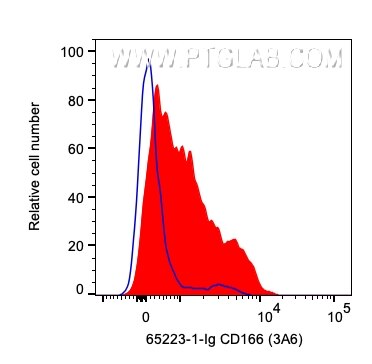ALCAM Monoklonaler Antikörper
ALCAM Monoklonal Antikörper für FC
Wirt / Isotyp
Maus / IgG1, kappa
Getestete Reaktivität
human
Anwendung
FC
Konjugation
Unkonjugiert
CloneNo.
3A6
Kat-Nr. : 65223-1-Ig
Synonyme
Geprüfte Anwendungen
| Erfolgreiche Detektion in FC | PHA treated human PBMCs |
Empfohlene Verdünnung
| Anwendung | Verdünnung |
|---|---|
| This reagent has been tested for flow cytometric analysis. It is recommended that this reagent should be titrated in each testing system to obtain optimal results. | |
| Sample-dependent, check data in validation data gallery | |
Produktinformation
65223-1-Ig bindet in FC ALCAM und zeigt Reaktivität mit human
| Getestete Reaktivität | human |
| Wirt / Isotyp | Maus / IgG1, kappa |
| Klonalität | Monoklonal |
| Typ | Antikörper |
| Immunogen | Cultured human thymic epithelial cells |
| Vollständiger Name | activated leukocyte cell adhesion molecule |
| Berechnetes Molekulargewicht | 105 kDa |
| GenBank-Zugangsnummer | BC057809 |
| Gene symbol | ALCAM |
| Gene ID (NCBI) | 214 |
| Konjugation | Unkonjugiert |
| Form | Liquid |
| Reinigungsmethode | Protein-G-Reinigung |
| Lagerungspuffer | PBS with 0.09% sodium azide |
| Lagerungsbedingungen | Store at 2-8°C. Stable for one year after shipment. |
Hintergrundinformationen
Activated leukocyte cell adhesion molecule (ALCAM, also known as CD166) is a cell adhesion molecule that belongs to the immunoglobulin superfamily. It is involved in cell-cell adhesion through homophilic and heterophilic (to CD6) interactions. ALCAM is widely expressed in a variety of normal tissues and cell types, including activated T cells and monocytes, epithelial cells, fibroblasts, neuronal cells, hepatocytes, and bone marrow mesenchymal stem cells (PMID: 7760007; 25221999). Altered ALCAM expression has been associated with the differentiation state and progression in some neoplasms including melanoma, prostate, colorectal, and breast cancers (PMID: 20461761; 18172759).
Protokolle
| PRODUKTSPEZIFISCHE PROTOKOLLE | |
|---|---|
| FC protocol for ALCAM antibody 65223-1-Ig | Download protocol |
| STANDARD-PROTOKOLLE | |
|---|---|
| Klicken Sie hier, um unsere Standardprotokolle anzuzeigen |


